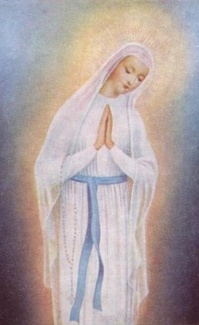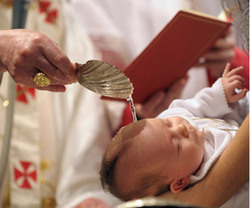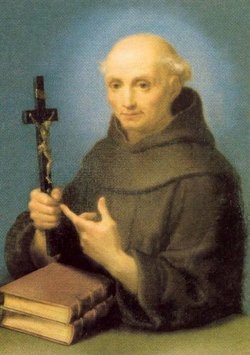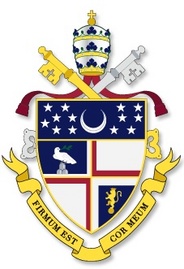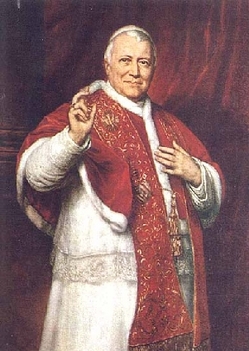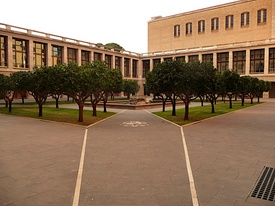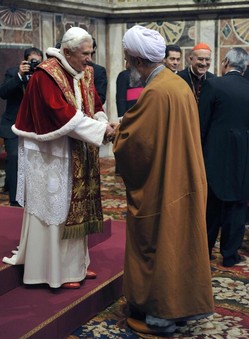Mary, the Mother of God, introduced herself as “I am the Blessed Virgin of the Poor” to an 11 year old girl in 1933. I am not all that familiar with this devotion to Our Lady of Banneux, but it is very appealing to me because of the gentleness of the vision and connection with the poor and the sick.
Month: January 2010
Saint Meinrad receives grant for youth program
Saint Meinrad Seminary and School of Theology, St.
Meinrad, IN, has been awarded an $895,000 grant from Lilly Endowment Inc. of
Indianapolis. The grant will be used as supplemental support for the “One
Bread, One Cup” youth liturgical leadership program.
a portion of the operating expenses of the program for five years. During that
time, Saint Meinrad will continue to build an endowment to replace the grant as
a source of operating revenue. Other costs of the program are covered by
participant fees.
program over the years,” said Fr. Godfrey Mullen, OSB, interim manager for the
“One Bread, One Cup” program. “Their support empowers Saint Meinrad to pass on
the Benedictine heritage of community and liturgy to another generation of
Catholics. Catholic youth and those who serve them will benefit greatly from
‘One Bread, One Cup’ because of the generosity of the Lilly Endowment.”
Continue reading Saint Meinrad receives grant for youth program
Understanding Atheism
Dominican Father Brian Davies is delivering the St Thomas Day Lecture entitled, “The New Atheism: Its Virtues and Its Vices,” on Thursday, January 28, 2010 at 7 p.m. at the Church of St Vincent Ferrer (Lexington & 66th Street, NYC).
Father Davies is a Dominican of the English Province but of Welsh heritage and a professor of philosophy at Fordham University
Baptism
The Baptism of the Lord [the feast celebrated this past Sunday, Jan 10] suggests quite well the general sense of the Christmas festivity in which the theme of “becoming sons of God” thanks to the only-begotten Son’s taking on of our humanity constitutes a dominant element. He became man so that we could become sons of God. God is born so that we could be re-born.
Saint Bernard of Corleone
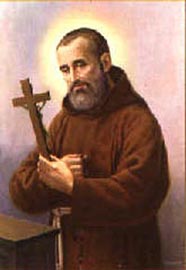 He humbled himself in all things and found favor with God. Great is the power of God; by the humble he is glorified.
He humbled himself in all things and found favor with God. Great is the power of God; by the humble he is glorified.
Saint Aelred of Rievaulx
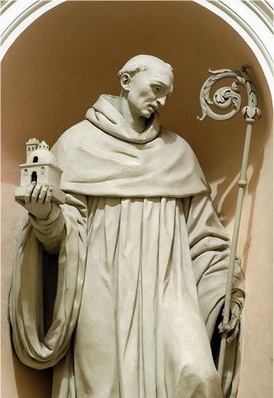 Pour into our hearts, O God, the Holy Spirit’s
Pour into our hearts, O God, the Holy Spirit’s
gift of love, that we, clasping each the other’s hand, may share the joy of
friendship, human and divine, and with Your servant Aelred draw many to Your
communion of love; through Jesus Christ the Righteous, who lives and reigns
with You in the unity of the Holy Spirit, one God, now and forever.
Saint Thomas of Cori
Pope reminds the Pontifical North American College (Rome) to remain faithful to its founding principals
As part of the 150th anniversary celebration of the Pontifical North American College, Pope Benedict XVI addressed a gathering of cardinals, bishops, priests, students and friends of the College on January 9, 2010. The PNAC was founded by Blessed Pius IX.
I am pleased to welcome the alumni of the Pontifical North
American College, together with the Rector, faculty and students of the
seminary on the Janiculum hill, and the student priests of the Casa Santa Maria
dell’Umiltà. Our meeting comes at the conclusion of the celebrations marking
the one hundred and fiftieth anniversary of the College’s establishment by my
predecessor, Blessed Pius IX. On this happy occasion I willingly join you in
thanking the Lord for the many ways in which the College has remained faithful
to its founding vision by training generations of worthy preachers of the
Gospel and ministers of the sacraments, devoted to the Successor of Peter and
committed to the building up of the Church in the United States of America.
It
is appropriate, in this Year for Priests, that you have returned to the College
and this Eternal City in order to give thanks for the academic and spiritual
formation which has nourished your priestly ministry over the years. The
present Reunion is an opportunity not only to remember with gratitude the time
of your studies, but also to reaffirm your filial affection for the Church of
Rome, to recall the apostolic labors of the countless alumni who have gone
before you, and to recommit yourselves to the high ideals of holiness, fidelity
and pastoral zeal which you embraced on the day of your ordination. It is
likewise an occasion to renew your love for the College and your appreciation
of its distinctive mission to the Church in your country.
During my Pastoral
Visit to the United States, I expressed my conviction that the Church in
America is called to cultivate “an intellectual ‘culture’ which is
genuinely Catholic, confident in the profound harmony of faith and reason, and
prepared to bring the richness of faith’s vision to bear on the pressing issues
which affect the future of American society” (Homily at Nationals Stadium,
Washington, 17 April 2008). As Blessed Pius IX rightly foresaw, the Pontifical
North American College in Rome is uniquely prepared to help meet this perennial
challenge. In the century and a half since its foundation, the College has
offered its students an exceptional experience of the universality of the
Church, the breadth of her intellectual and spiritual tradition, and the
urgency of her mandate to bring Christ’s saving truth to the men and women of
every time and place. I am confident that, by emphasizing these hallmarks of a
Roman education in every aspect of its program of formation, the College will
continue to produce wise and generous pastors capable of transmitting the
Catholic faith in its integrity, bringing Christ’s infinite mercy to the weak
and the lost, and enabling America’s Catholics to be a leaven of the Gospel in
the social, political and cultural life of their nation.
Dear brothers, I pray
that in these days you will be renewed in the gift of the Holy Spirit which you
received on the day of your ordination. In the College chapel, dedicated to the
Blessed Virgin Mary under the title of the Immaculate Conception, Our Lady is
portrayed in the company of four outstanding models and patrons of priestly
life and ministry: Saint Gregory the Great, Saint Pius X, Saint John Mary
Vianney and Saint Vincent de Paul. During this Year for Priests, may these
great saints continue to watch over the students who daily pray in their midst;
may they guide and sustain your own ministry, and intercede for the priests of
the United States. With cordial good wishes for the spiritual fruitfulness of
the coming days, and with great affection in the Lord, I impart to you my
Apostolic Blessing, which I willingly extend to all the alumni and friends of
the Pontifical North American College.
Pope speaks to the Diplomatic Corps for 2010
What follows are excerpts of an address the Holy Father gave to the
Diplomatic Corps accredited to the Holy See today, January 11. I selected what I thought were some germane points for our consideration.
[…]
The Church is
open to everyone because, in God, she lives for others! She thus shares deeply
in the fortunes of humanity, which in this new year continues to be marked by
the dramatic crisis of the global economy and consequently a serious and
widespread social instability. In my Encyclical Caritas in Veritate, I invited
everyone to look to the deeper causes of this situation: in the last analysis,
they are to be found in a current self-centred and materialistic way of
thinking which fails to acknowledge the limitations inherent in every creature.
Today I would like to stress that the same way of thinking also endangers
creation. Each of us could probably cite an example of the damage that this has
caused to the environment the world over. I will offer an example, from any
number of others, taken from the recent history of Europe. Twenty years ago,
after the fall of the Berlin wall and the collapse of the materialistic and
atheistic regimes which had for several decades dominated a part of this
continent, was it not easy to assess the great harm which an economic system
lacking any reference to the truth about man had done not only to the dignity
and freedom of individuals and peoples, but to nature itself, by polluting
soil, water and air? The denial of God distorts the freedom of the human
person, yet it also devastates creation. It follows that the protection of
creation is not principally a response to an aesthetic need, but much more to a
moral need, in as much as nature expresses a plan of love and truth which is
prior to us and which comes from God.
It is proper, however, that this concern
and commitment for the environment should be situated within the larger
framework of the great challenges now facing mankind. If we wish to build true
peace, how can we separate, or even set at odds, the protection of the
environment and the protection of human life, including the life of the unborn?
It is in man’s respect for himself that his sense of responsibility for
creation is shown. As Saint Thomas Aquinas has taught, man represents all that
is most noble in the universe (cf. Summa Theologiae, I, q. 29, a. 3).
Furthermore, as I noted during the recent FAO World Summit on Food Security,
“the world has enough food for all its inhabitants” (Address of 16
November 2009, No. 2) provided that selfishness does not lead some to hoard the
goods which are intended for all.
I would like to stress again that the
protection of creation calls for an appropriate management of the natural
resources of different countries and, in the first place, of those which are
economically disadvantaged. I think of the continent of Africa, which I had the
joy of visiting last March during my journey to Cameroon and Angola, and which
was the subject of the deliberations of the recent Special Assembly of the
Synod of Bishops. The Synod Fathers pointed with concern to the erosion and
desertification of large tracts of arable land as a result of overexploitation
and environmental pollution (cf. Propositio 22). In Africa, as elsewhere, there
is a need to make political and economic decisions which ensure “forms of
agricultural and industrial production capable of respecting creation and
satisfying the primary needs of all” (Message for the 2010 World Day of
Peace, No. 10).
How can we forget, for that matter, that the struggle for
access to natural resources is one of the causes of a number of conflicts, not
least in Africa, as well as a continuing threat elsewhere? For this reason too,
I forcefully repeat that to cultivate peace, one must protect creation!
Furthermore, there are still large areas, for example in Afghanistan or in some
countries of Latin America, where agriculture is unfortunately still linked to
the production of narcotics, and is a not insignificant source of employment
and income. If we want peace, we need to preserve creation by rechanneling
these activities; I once more urge the international community not to become
resigned to the drug trade and the grave moral and social problems which it
creates.
To carry our reflection further, we must remember that the problem of
the environment is complex; one might compare it to a multifaceted prism.
Creatures differ from one another and can be protected, or endangered, in
different ways, as we know from daily experience. One such attack comes from
laws or proposals which, in the name of fighting discrimination, strike at the
biological basis of the difference between the sexes. I am thinking, for
example, of certain countries in Europe or North and South America. Saint
Columban stated that: “If you take away freedom, you take away
dignity” (Ep. 4 ad Attela, in S. Columbani Opera, Dublin, 1957, p. 34).
Yet freedom cannot be absolute, since man is not himself God, but the image of
God, God’s creation. For man, the path to be taken cannot be determined by
caprice or willfulness, but must rather correspond to the structure willed by
the Creator.
[…]
Blessed Bernard Scammacca
Merciful God, you led
Blessed Bernard along the path of conversion and evangelical perfection. With
the help of his prayers and by following his example may we have sorrow for our
offenses and turn to you with hearts cleansed of sin.
